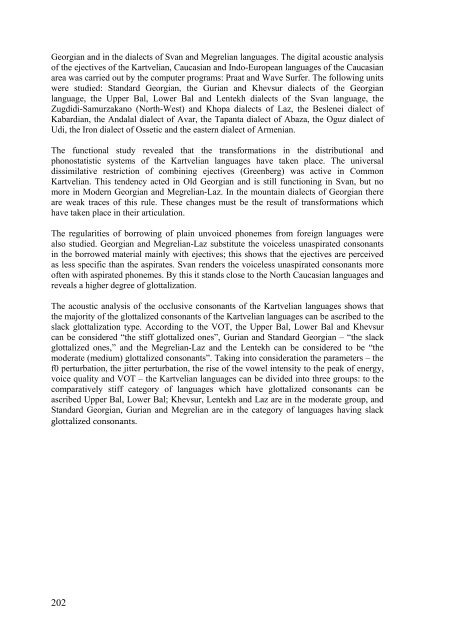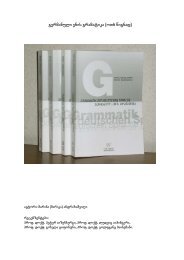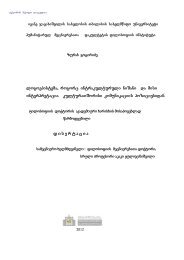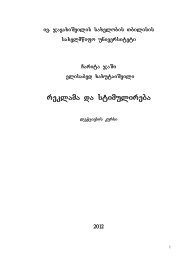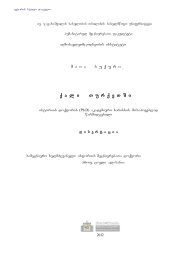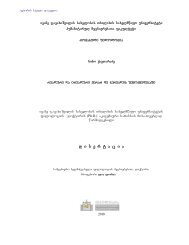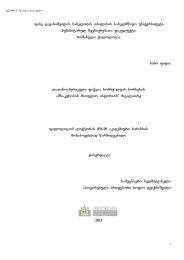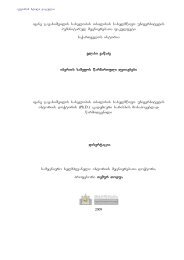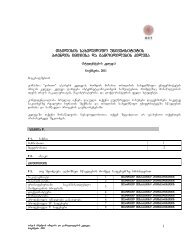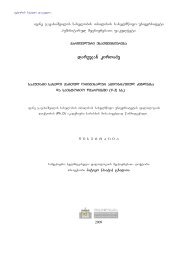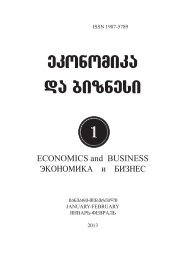issues of linguistics - Tbilisi State University
issues of linguistics - Tbilisi State University
issues of linguistics - Tbilisi State University
You also want an ePaper? Increase the reach of your titles
YUMPU automatically turns print PDFs into web optimized ePapers that Google loves.
Georgian and in the dialects <strong>of</strong> Svan and Megrelian languages. The digital acoustic analysis<br />
<strong>of</strong> the ejectives <strong>of</strong> the Kartvelian, Caucasian and Indo-European languages <strong>of</strong> the Caucasian<br />
area was carried out by the computer programs: Praat and Wave Surfer. The following units<br />
were studied: Standard Georgian, the Gurian and Khevsur dialects <strong>of</strong> the Georgian<br />
language, the Upper Bal, Lower Bal and Lentekh dialects <strong>of</strong> the Svan language, the<br />
Zugdidi-Samurzakano (North-West) and Khopa dialects <strong>of</strong> Laz, the Beslenei dialect <strong>of</strong><br />
Kabardian, the Andalal dialect <strong>of</strong> Avar, the Tapanta dialect <strong>of</strong> Abaza, the Oguz dialect <strong>of</strong><br />
Udi, the Iron dialect <strong>of</strong> Ossetic and the eastern dialect <strong>of</strong> Armenian.<br />
The functional study revealed that the transformations in the distributional and<br />
phonostatistic systems <strong>of</strong> the Kartvelian languages have taken place. The universal<br />
dissimilative restriction <strong>of</strong> combining ejectives (Greenberg) was active in Common<br />
Kartvelian. This tendency acted in Old Georgian and is still functioning in Svan, but no<br />
more in Modern Georgian and Megrelian-Laz. In the mountain dialects <strong>of</strong> Georgian there<br />
are weak traces <strong>of</strong> this rule. These changes must be the result <strong>of</strong> transformations which<br />
have taken place in their articulation.<br />
The regularities <strong>of</strong> borrowing <strong>of</strong> plain unvoiced phonemes from foreign languages were<br />
also studied. Georgian and Megrelian-Laz substitute the voiceless unaspirated consonants<br />
in the borrowed material mainly with ejectives; this shows that the ejectives are perceived<br />
as less specific than the aspirates. Svan renders the voiceless unaspirated consonants more<br />
<strong>of</strong>ten with aspirated phonemes. By this it stands close to the North Caucasian languages and<br />
reveals a higher degree <strong>of</strong> glottalization.<br />
The acoustic analysis <strong>of</strong> the occlusive consonants <strong>of</strong> the Kartvelian languages shows that<br />
the majority <strong>of</strong> the glottalized consonants <strong>of</strong> the Kartvelian languages can be ascribed to the<br />
slack glottalization type. According to the VOT, the Upper Bal, Lower Bal and Khevsur<br />
can be considered “the stiff glottalized ones”, Gurian and Standard Georgian – “the slack<br />
glottalized ones,” and the Megrelian-Laz and the Lentekh can be considered to be “the<br />
moderate (medium) glottalized consonants”. Taking into consideration the parameters – the<br />
f0 perturbation, the jitter perturbation, the rise <strong>of</strong> the vowel intensity to the peak <strong>of</strong> energy,<br />
voice quality and VOT – the Kartvelian languages can be divided into three groups: to the<br />
comparatively stiff category <strong>of</strong> languages which have glottalized consonants can be<br />
ascribed Upper Bal, Lower Bal; Khevsur, Lentekh and Laz are in the moderate group, and<br />
Standard Georgian, Gurian and Megrelian are in the category <strong>of</strong> languages having slack<br />
glottalized consonants.<br />
202


